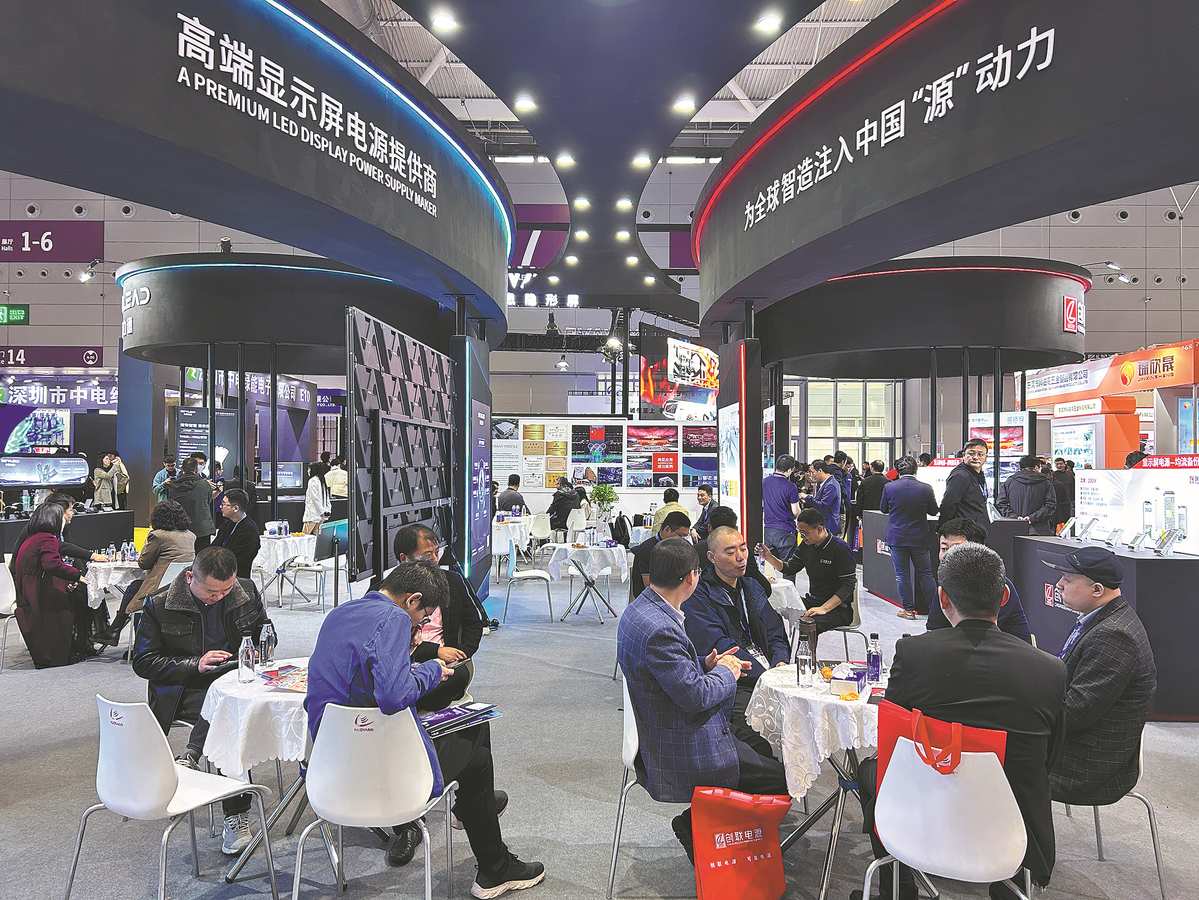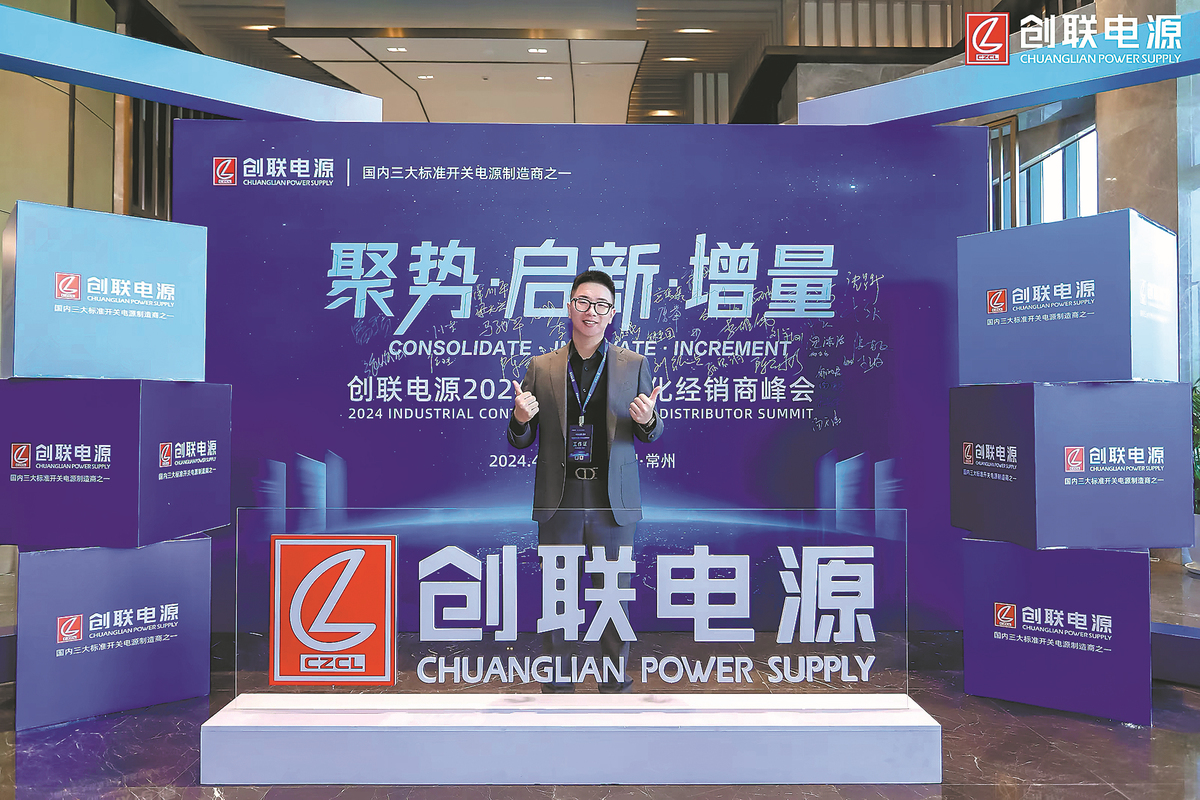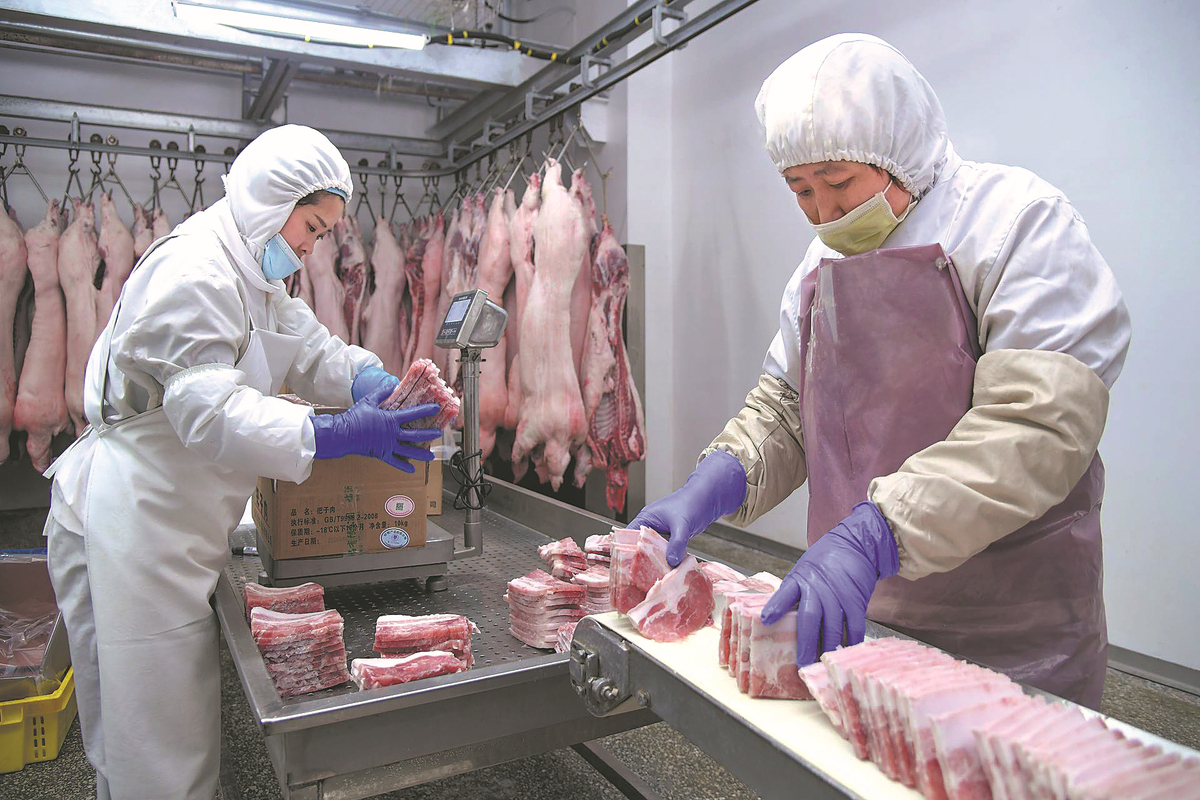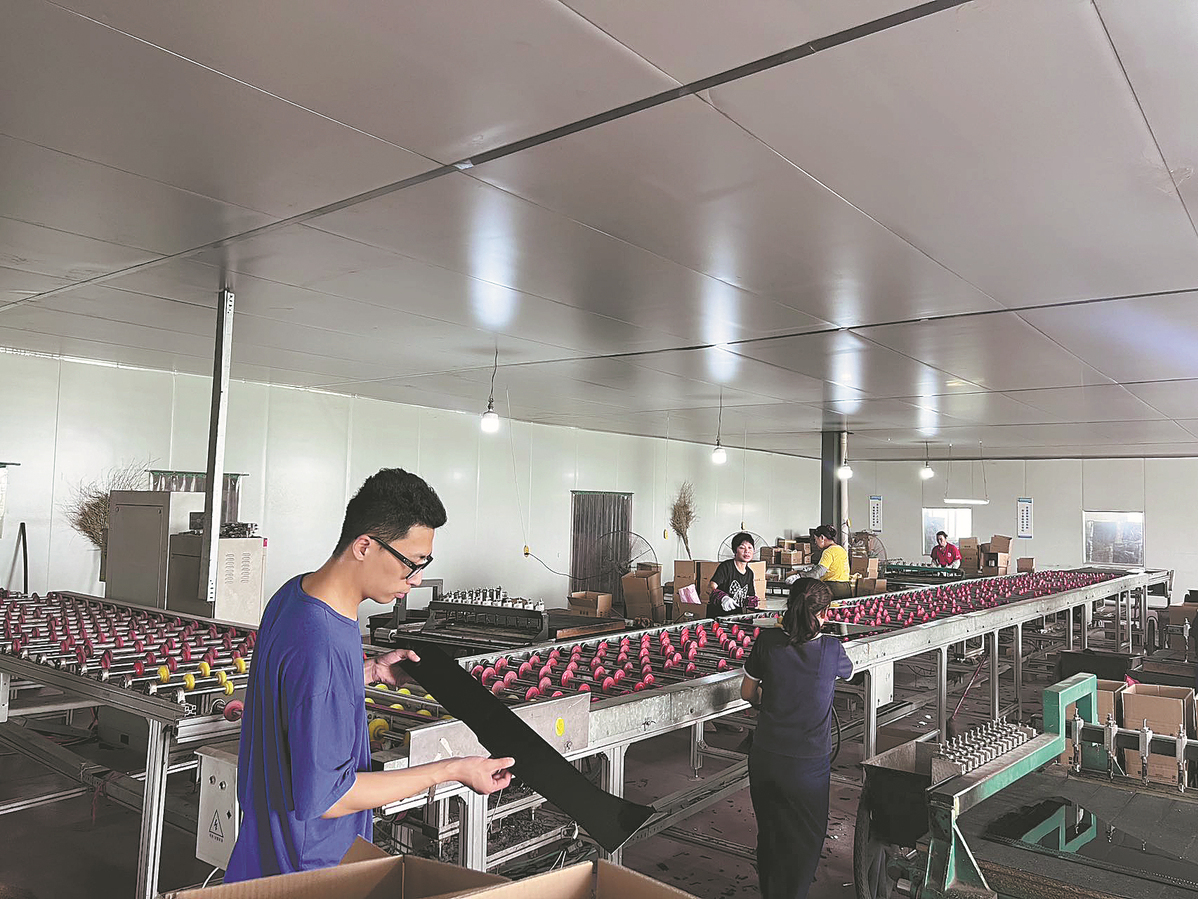
The heirs to enterprises built by their parents in the 1990s, China's second-generation factory owners are facing a tough decision — should they continue the once-successful family businesses in the face of the changing economic landscape?
More than 80 percent of China's 1 billion private enterprises are family-owned, with about 29 percent of them in traditional manufacturing, according to a report released by the All-China Federation of Industry and Commerce.
From 2017 to 2022, around three-fourths of China's family businesses found themselves in the midst of a leadership transition, marking the largest succession wave in the country's history.
This transition has sparked mixed reactions. While some people criticize the inheritors' effortless road to prosperity, others covet their financial freedom and the golden opportunities handed to them.

Tang Cheng, 32, is the second-generation inheritor of the family-owned Chuanglian Power Supply Technology Co, in Changzhou, Jiangsu province. He graduated from Deakin College in Victoria, Australia, in 2017 with a business management degree and took a six-month internship at an import and export company before joining his family's business.
He acknowledges he has "effortlessly reaped the benefits" of his life and accepts his destiny. "Since I don't have any particularly outstanding abilities or distinctive traits, why shouldn't I pursue something with great development prospects, even if it might not be something I'm especially interested in?" said Tang.
Founded in March 2000, the national-level company focuses on displays, lighting, industrial power controls, and specialized power supplies, and has more than 2,000 products. It is also involved in research and development, manufacturing, and sales, and employs over 600 people. The Changzhou manufacturing plant occupies 22,000 square meters and the company will move its operations to a new 54,000-sq-m site later this year.
Although his parents didn't force him to take over the business, Tang said as an only child he felt obliged to continue his father's success.
"I witnessed its growth from a small workshop, gradually moving to rented factory buildings, then to our own small factory, and finally to a large factory," he said. "The core of the business is that my parents have integrated all resources, and operate them with a very scientific and business-oriented logic," he added.
ALSO READ: PwC: China family businesses need better succession planning
However, Tang is aware that business acumen is not a skill that's inherited, and sees himself as a "relay runner" in his parents' industry. He also realizes there aren't "many century-old enterprises" in China, which he says gives him a sense of urgency to "challenge the idea that wealth doesn't last beyond three generations".
Since returning to the family business in January 2018, he has prepared for the succession process. He learned the ropes of running the company by spending three years in procurement, then marketing, and finally the sales department. "Only after learning do you know what you need to do, and understand how to operate the framework and processes," he said.
The son also rises
Over the past six years, Tang has observed how his parents divide the company duties. His mother manages internal affairs, production, and operations, while his father focuses on technology, procurements, and sales. His father originally trained in grain management and carved out his own fortune in the electronics industry.
However, Tang acknowledges he encountered the issue of smooth succession of the business. "My parents have strong personalities, and initially, any requests or ideas would be shot down and rejected," he said.
When Tang took charge of marketing this year and established information departments, the conflict became more obvious, he said. "As I pushed for focusing on informatization and implementing new systems, my father's insistence on prioritizing product development led to numerous arguments, highlighting the generational divide in our approaches to modernizing the family business," he said.
"However, as the company faced challenges meeting the orders of large manufacturers, they gradually recognized the need to modernize."
Nearly 65 percent of Chinese family businesses plan to pass ownership to the next generation, according to the 2021 PwC Global Family Business Survey. About 55 percent of these businesses already have a digital transformation strategy in place, while approximately 70 percent say they will prioritize sustainable development goals, the survey revealed.
With the company already achieving 840 million yuan ($117 million) in annual sales, Tang is cautious about setting lofty goals. "I'm thinking about adding some innovation to our business model, like incorporating self-media and e-commerce to make our products recognizable to end consumers by addressing the demands of customers and influencing their consumption habits," he said.
Returnees adapt
About 83 percent of second-generation successors have overseas educational backgrounds, according to the Hurun Research Institute's 2021 China Family Business Inheritance Report.

Gao Lin, 34, graduated from the University of Liverpool in the United Kingdom with a business degree and Australia's University of Sydney with an MBA.
She said earlier she had mixed feelings about her father's business, Linyi Shunfa Food Co, a leading pork processing company in Shandong province.
"It provided me with relatively affluent material conditions, but I also resented this enterprise for depriving me of time with my parents," she said, recalling the hardship in the early days of the business being established.
During her university years, her holidays consisted of getting off a plane looking like a well-dressed young woman, then going to the family's small flat, changing into work clothes and heading to their butcher shop to cut and weigh meat for customers while her mother managed the cash register.
Gao began studying for her MBA in 2021 to prepare for the succession. "Rather than being a successor, I'm more like a flexible worker who goes wherever I'm needed," she said, describing her first three years at the company.
She now manages her own team and oversees some sections of the business. Gaining experience has made her aware of her shortcomings. "In our industry, experience outweighs ability, so I must constantly remind myself to keep learning in order to become more well-rounded," said Gao, who immersed herself in factory operations for three months to learn every aspect of the business.
About 62 percent of second-generation successors choose to return to the family business, data from the China Family Business Research Centre at Renmin University of China in 2022 showed. Approximately 68 percent of the successors implemented some form of business transformation after taking over, the data indicated.

Gao has been instrumental in modernizing the company's approach, particularly in e-commerce and brand recognition. Under her leadership, Shunfa has collaborated with top livestream sellers, achieving annual sales in the tens of millions of yuan through online channels.
"Innovation is not about breaking conventions but adding icing on the cake. I'm quick to surf the internet and have the ability to accept new things, so I went into e-commerce," she said.
Gao envisions Shunfa becoming a household brand synonymous with safe meat products. "I hope that in the future, people can buy Shunfa pork in any supermarket they walk into," she said.
Generation gap
Research by consultancy McKinsey& Company on family businesses shows the difficulties in sustaining family enterprises across multiple generations.
Globally, family enterprises have an average life span of 24 years with only about 30 percent successfully transitioning to the second generation, the research showed.
Less than 13 percent of the businesses reach the hands of the third generations, and only 5 percent of family businesses continue to create shareholder value beyond this generation.
Zhang Lili, 29, has offered consultations for a cohort of second-generation factory owners since July last year. She said the most significant challenge they face is the fixed mindset of the older generation in the face of the changing economic situation.
Many of the second generation, aged from 18 to 32 years, have a good education, broader vision, a more comprehensive understanding of human nature, and higher emotional intelligence in dealing with people.
However, they have little experience in cultivating a mature work system. "They have infinite responsibilities and expectations, but, pitifully, little practical experience," Zhang said.
The biggest obstacle in implementing their ideas is often the lack of understanding from the older generation, and being obstructed by "veterans" in the family business, she said. "Any attempt to implement something new is likely to move someone else's 'cheese'," said Zhang.

Reluctant successor
He Yulong, 28, took over Xuchang Tianhe Welding Device Co, in Xuchang, Henan province, in circumstances he had little control over.
He has a bachelor's degree from Texas Christian University in Fort Worth, Texas, and a master's in entrepreneurship from Massachusetts-based Babson College.
His father passed away at the end of 2021, leaving him to manage a "family-oriented company where senior positions are held by relatives with differing opinions", He said.
"The reality of managing a business is very different from my idealized dreams; it's far more stressful and challenging. Over time, I've gained recognition for my management abilities and have worked closely with my father's friends on finer management details," he said.
Established in 1986, Tianhe Welding Device primarily produces optical glass. The factory has over 200 employees, generating annual sales revenue of 70 to 80 million yuan, with 90 percent of products exported to long-term clients.
In his childhood, he witnessed the production process of glass firsthand and knew he would eventually take over the expanding operations. His main responsibilities involve coordinating operations, developing new products, managing after-sales and communications, handling government affairs, and liaising with new clients.
"I'm keen on stability rather than aggressive growth by focusing on retaining the current pace for at least the next five years without aggressively pursuing new products," he said, adding he has made changes to management, reduced costs, introduced new equipment, and diversified suppliers.
He plans to explore internet sales to increase the company's visibility and expand market reach. "However, we face significant challenges as the company is experiencing a crisis and is unable to recruit new talent. This is my greatest concern and struggle at present," he said.
READ MORE: 'Chinese family businesses face succession challenge'
About 70 percent of private enterprise founders hope to pass on the business to a family member, according to the 2022 China Private Enterprise Development Report by the All-China Federation of Industry and Commerce. Approximately two-thirds of second-generation successors believe their business needs technological and management innovation to thrive.
Zhan Yubo, director of the Innovation Economy Research Centre at the Shanghai Academy of Social Sciences, said the pressure on the second generation is significant. While they excel in new media, livestreaming, and e-commerce and show keen market awareness, they need integration into business operations and training. They have grown up in more affluent circumstances, but have not experienced the hardships of their predecessors.
"To sustain and build upon the company's success, it might be more effective to employ professional managers. While the first generation achieved success through effort and opportunity, the second generation's abilities and experiences may not always match those of their predecessors," Zhan said.


